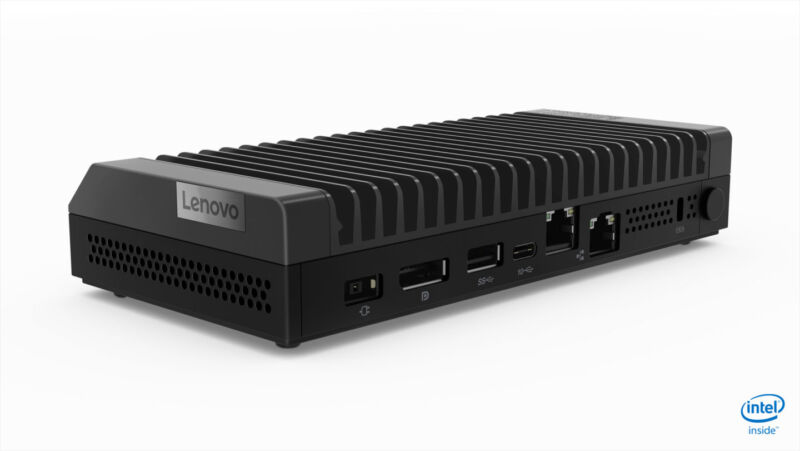
Enlarge / This ThinkCentre M90n-1 Nano from 2019, passively cooled with a big heatsink, was $145 when the author last looked on eBay. It's not a Raspberry Pi, and it looks like Batman's reception desk system, but it can do the work. (credit: Andrew Cunningham)
"Raspberry Pi boards are hard to get, probably also next year," says Andreas Spiess, single-board enthusiast and YouTuber, in his distinctive Swiss accent. He's not wrong. Spiess says he and his fellow Pi devotees need "a strategy to survive" without new boards, so he suggests looking in one of the least captivating, most overlooked areas of computing: used, corporate-minded thin client PCs.
Andreas Spiess' suggestion to "survive" the Raspberry Pi shortage: cheap thin clients.
Spiess' Pi replacements, suggested and refined by many of his YouTube commenters and Patreon subscribers, are Fujitsu Futros, Lenovo ThinkCentres, and other small systems (some or all of which could be semantically considered "thick clients" or simply "mini PCs," depending on your tastes and retro-grouch sensibilities). They're the kind of systems you can easily find used on eBay, refurbished on Amazon Renewed, or through other enterprise and IT asset disposition sources. They're typically in good shape, given their use and environment. And compared to single-board enthusiast systems, many more are being made and replaced each year.
They've always been there, of course, but it makes more sense to take another look at them now. "Back to the future," as Spiess puts it (in an analogy we're not entirely sure works).
Read 5 remaining paragraphs | Comments

Enlarge / This ThinkCentre M90n-1 Nano from 2019, passively cooled with a big heatsink, was $145 when the author last looked on eBay. It's not a Raspberry Pi, and it looks like Batman's reception desk system, but it can do the work. (credit: Andrew Cunningham)
"Raspberry Pi boards are hard to get, probably also next year," says Andreas Spiess, single-board enthusiast and YouTuber, in his distinctive Swiss accent. He's not wrong. Spiess says he and his fellow Pi devotees need "a strategy to survive" without new boards, so he suggests looking in one of the least captivating, most overlooked areas of computing: used, corporate-minded thin client PCs.
Andreas Spiess' suggestion to "survive" the Raspberry Pi shortage: cheap thin clients.
Spiess' Pi replacements, suggested and refined by many of his YouTube commenters and Patreon subscribers, are Fujitsu Futros, Lenovo ThinkCentres, and other small systems (some or all of which could be semantically considered "thick clients" or simply "mini PCs," depending on your tastes and retro-grouch sensibilities). They're the kind of systems you can easily find used on eBay, refurbished on Amazon Renewed, or through other enterprise and IT asset disposition sources. They're typically in good shape, given their use and environment. And compared to single-board enthusiast systems, many more are being made and replaced each year.
They've always been there, of course, but it makes more sense to take another look at them now. "Back to the future," as Spiess puts it (in an analogy we're not entirely sure works).
Read 5 remaining paragraphs | Comments
November 29, 2022 at 11:33PM

Post a Comment